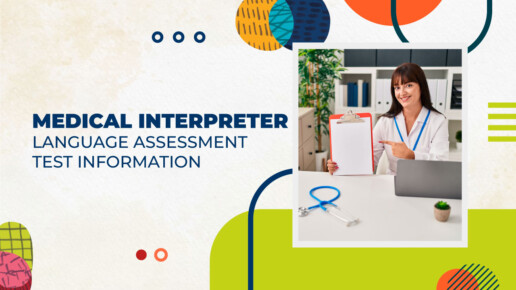Medical Interpreter Language Assessment Test Information
In the world of healthcare, effective communication is paramount. It bridges the gap between healthcare providers and patients who speak different languages. Medical interpreters play a crucial role in ensuring that patients receive the care they need by facilitating communication. To become a qualified medical interpreter, one must pass a language assessment test. In this blog, Metaphrasis delves into the details of the Medical Interpreter Language Assessment Test, shedding light on what it entails, its importance, and how to prepare for it.
Understanding the Medical Interpreter Language Assessment Test
The Medical Interpreter Language Assessment Test is a standardized examination designed to evaluate an individual’s proficiency in a specific language, as well as their ability to accurately interpret medical information between patients and healthcare providers. This test is crucial in ensuring that medical interpreters can bridge language barriers effectively, promoting patient safety and quality care.
Why is the Test Important?
Ensuring Patient Safety: Effective communication is vital in healthcare settings to prevent misunderstandings that could lead to medical errors.
Legal Requirements: Many healthcare institutions and jurisdictions require medical interpreters to pass this test to meet regulatory standards.
Quality Care: Patients deserve to receive care that respects their language and cultural preferences. The test ensures interpreters can provide this level of care.
Preparing for the Medical Interpreter Language Assessment Test
- Understand the Test Format
Before diving into preparation, it’s essential to familiarize yourself with the test format. The exam typically includes written and oral components, assessing your language proficiency and interpreting skills.
- Language Proficiency
The written component often includes grammar, vocabulary, and comprehension exercises. Brush up on your language skills through textbooks and online resources.
- Medical Terminology
Medical interpreters and translators need a solid grasp of medical terminology. Study medical glossaries and practice translating medical terms accurately.
- Role Play
The oral component involves role-playing scenarios commonly encountered in healthcare settings. Practice interpreting these scenarios with a mentor or colleague.
- Ethics and Cultural Sensitivity
Medical interpreters must adhere to ethical guidelines and demonstrate cultural sensitivity. Understand the code of ethics for medical interpreters and practice scenarios that involve cultural nuances.
- Sample Tests
Take advantage of sample tests and study materials provided by accredited institutions. These resources can help you gauge your readiness for the actual exam.
Taking the Test
When you’re confident in your preparation, it’s time to schedule and take the Medical Interpreter Language Assessment Test. Be sure to arrive well-rested and calm on test day. During the exam, stay focused and remember your training.
Conclusion
Becoming a qualified medical interpreter is a noble endeavor that requires dedication and proficiency in both language and medical knowledge. The Medical Interpreter Language Assessment Test serves as a crucial milestone on this journey, ensuring that interpreters can provide the highest standard of care by breaking down language barriers in healthcare.

